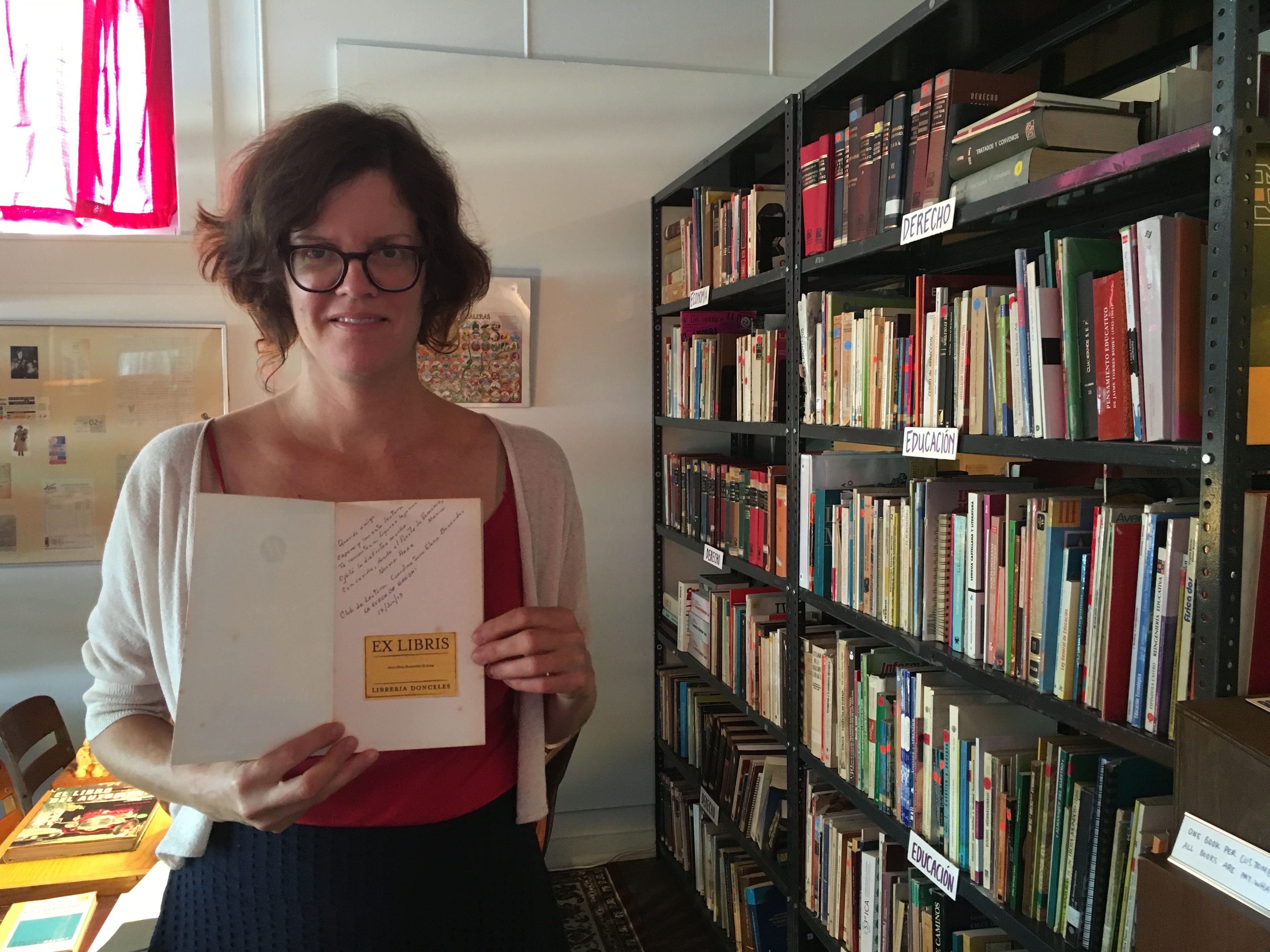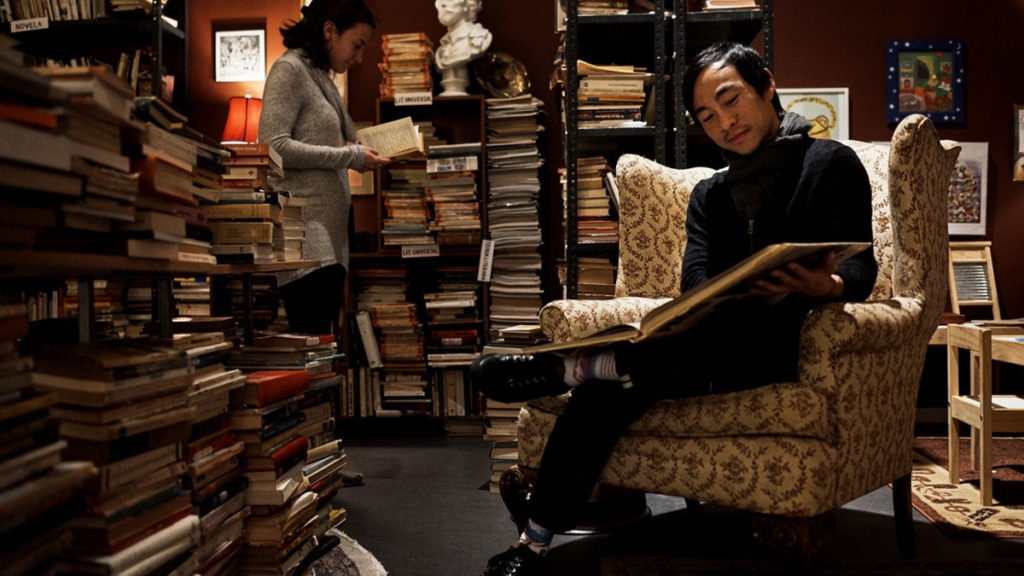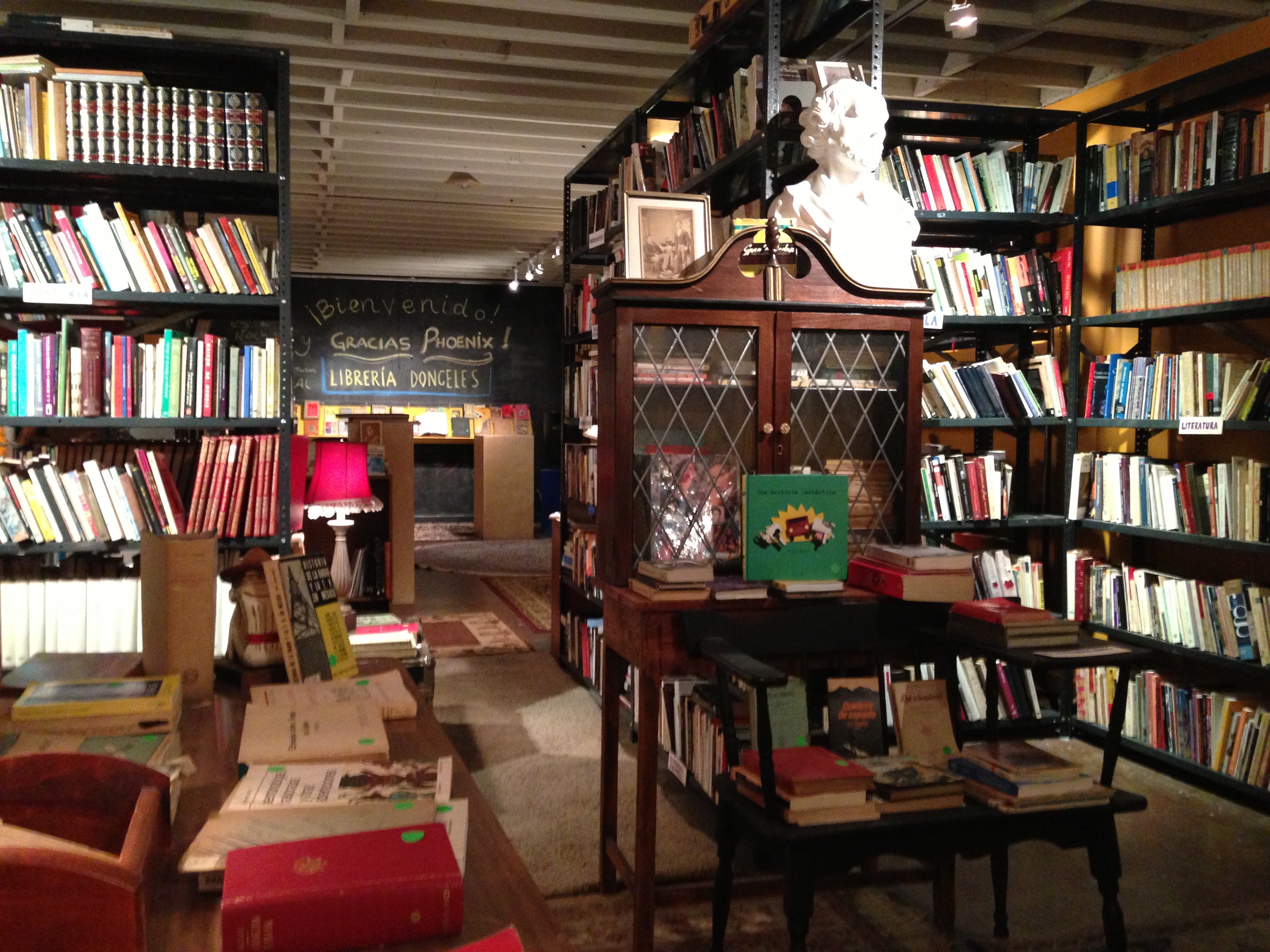This week’s returning author, Marshall Reese, is an artist working in new technologies, video, installations, artists books and limited editions. He has worked in collaboration with Nora Ligorano as LigoranoReese for over two decades.
This blog post is part of periodic series from contributor Marshall Reese that focuses on “outsider archivists,” people who highlight the tensions between traditional and born-digital archives and the transition between the two. Mnemosyne is the Greek goddess of memory, the mother of the nine muses. Her significance only seems to grow as we externalize more and more of information, data, and records.
Ex Libris – Librería Donceles
The last quarter-century has been in a period of profound transition, moving from the vestiges of material cultures with their impending sense of past histories to the continuous present that more readily erases and transforms the past, maybe even the future, too, collapsing and flattening both into a constellation of immaterial pixels.
“Ex Libris” takes on multiple meanings in this universe. Though usually affixed to the inside cover of a book as a symbol of ownership and library stewardship, for today’s online book retailers like Amazon and Apple, and for many readers of digital books, it just as likely means “ex-book.” It’s as if the codex book, with its spine, covers, and bound pages is a castaway, no more than a departed artifact, a process of content acquisition, however, that has cost us much more than simple material effects. This has provoked librarians, book and library conservators, and artists alike to look at collections, archives, and libraries anew: as sources for reappraisal and transformation and to even make into artworks.
In 2013, artist and educator Pablo Helguera began an art installation project situating the book – or, rather, the ex-book – at the crossroads of commerce, book ownership, community, and culture. He opened the first of several itinerant, second-hand bookstores called Librería Donceles in Red Hook, Brooklyn. Though hardly a retail chain, over the years, his store has had 7 iterations across the United States, open most recently at the Museum of Art in Santa Cruz, California.
Something that’s “second-hand” immediately implies prior use, that it was manipulated, held, and gripped by another’s fingers long before your own. It could have been some cherished object or close personal effect, inscribed with its own sense of history. Helguera’s Librería Donceles recovers this sense of the book as object, placing it in the tradition and curation of the used bookstore. Since 2016, insurgent cultural forces have given Donceles an unexpected urgency, melding the “normal” competition between cultural identity and the use of language with far more incendiary immigration politics on the South border.
It’s clear that this project is one of a devoted bibliophile. I met Pablo in 2008 in his role as Director of Public Programs at MoMA and have followed his work since. He and I talked about Donceles via email.
“I have always had a fondness for books. Now that I see the project in perspective, I believe that I unconsciously made a direct relationship between books and Latin America, because I grew up in Mexico City, in a family house surrounded by them.”
Moving to Chicago as a student, bookstores were a haven for Helguera. The Europa bookstore on State Street drew him in with French, Italian, and German books. There he found new and old books by Spanish and Latin American authors.
A few years later in New York, the dearth of Spanish speaking publications astonished him. As a sort of palliative to that, he even worked for a brief time as a journalist for a local Daily Spanish periodical.
The closing of several Spanish bookstores in his new city – one with over 2 million Spanish speakers, equal in size to the city of Puebla, Mexico – inspired him to “get books in Spanish back to New York.” But he also conceived the project beyond granting access to Spanish books. It became about renegotiating the representation of Mexican and Latin American culture and its presence in North America; i.e., U.S culture.
“I have always felt that whenever Mexican or Latin American culture is celebrated, what is normally highlighted is the country’s folklore or popular culture. We showcase banda music, folkloric ballet, or tacos. But Mexico, for instance, is much more than that. It is the poetry of Xavier Villaurrutia, the fiction of Juan Rulfo, the erudite essays of Alfonso Reyes, the poetry of Sor Juana, the poetry of José Gorostiza. Almost never have I seen anyone in New York reading these authors. Mexico has contributed greatly to all disciplines: anthropology, political theory, history, and more. I wanted to construct a place that could showcase the complexity of what a cultural heritage is beyond the folkloric clichés.”
The Libreria Donceles is a fusion project blending Helguera’s Mexican and American experiences, taking its name from a downtown Mexico City street famously clustered with bookstores that Helguera often frequented with the familiar memories of his mother’s apartment in Chicago.
“It still contains many of the books with which I grew up. When my parents emigrated from Mexico City to Chicago, they brought everything they had with them, including the things that belonged to their parents and grandparents, a place that immediately transports you to the past. Books in Spanish have always drawn me closer to that original environment that I always felt as comforting.”
The project also draws its appearance and décor from the used bookstores Helguera visited as a student.
“The look of Donceles takes a page (pun intended) from the used bookstores that frequented as a student in Chicago. Quirky places run by eccentric men and women, who arranged the books usually in chaotic manners and decorated the place in their own idiosyncratic way. The bookstores felt like their own living rooms, in a way. When I started designing Donceles, I intuitively started bringing lamps, rugs and other objects that created that kind of atmosphere.”
Entering Helguera’s Librería at Kent Gallery in Chelsea, turning the corner that separates the entrance from the main gallery reveals metal shelves holding books classified by subject. In between spaces filled with pleasant bric-a-brac, the shelves’ contents beckoned me to explore them, sifting through volumes of notable Spanish and Latin American authors, poets, cultural theorists, board games, and postcards.
“A bookstore, to me, is a place of possibility, of daydreaming, of exploration and discovery, but more importantly, it is a place for learning. Because I went to an art school I was unable to get a traditional liberal arts education, so I went to bookstores, got myself lost in various bookshelves to find obscure writers and ideas. That was my version of research, of finding knowledge.”
Helguera has attached each volume for sale in Librería Donceles with an ex libris bearing the name of the book’s former owner. The Librería’s books become vessels of communication that link the present owner of the book with the past, expanding the connections between the book and the reader to those who have proceeded them. For many, including Helguera, this connection has been deeply visceral.
“My brother, Luis Ignacio Helguera, who was a writer, died tragically 15 years ago. I ended up with many of his books. I really appreciate all the notes he would write in each book, as whenever I read them, I feel I am reading it with him. This is the special quality of the used book – it has been read by another, it contains, to an extent, the experiences of another reader.”
The book in Helguera’s installation is like a pebble cast into a body of water: hitting the surface, its influences and resonances ripple out. Librería Donceles is commendable for amplifying and transforming what is often the private experience of a reader, making links with the social through the community to broaden cultural understanding. Under the current administration, and President Trump in particular, making these connections for drawing different people and cultures together becomes even more essential.
“Whenever you are questioning a culture — as we are in this moment when immigration is being criminalized — it is really important that there is a richness to every culture. Before you condemn an entire culture, you should really better understand it.”



